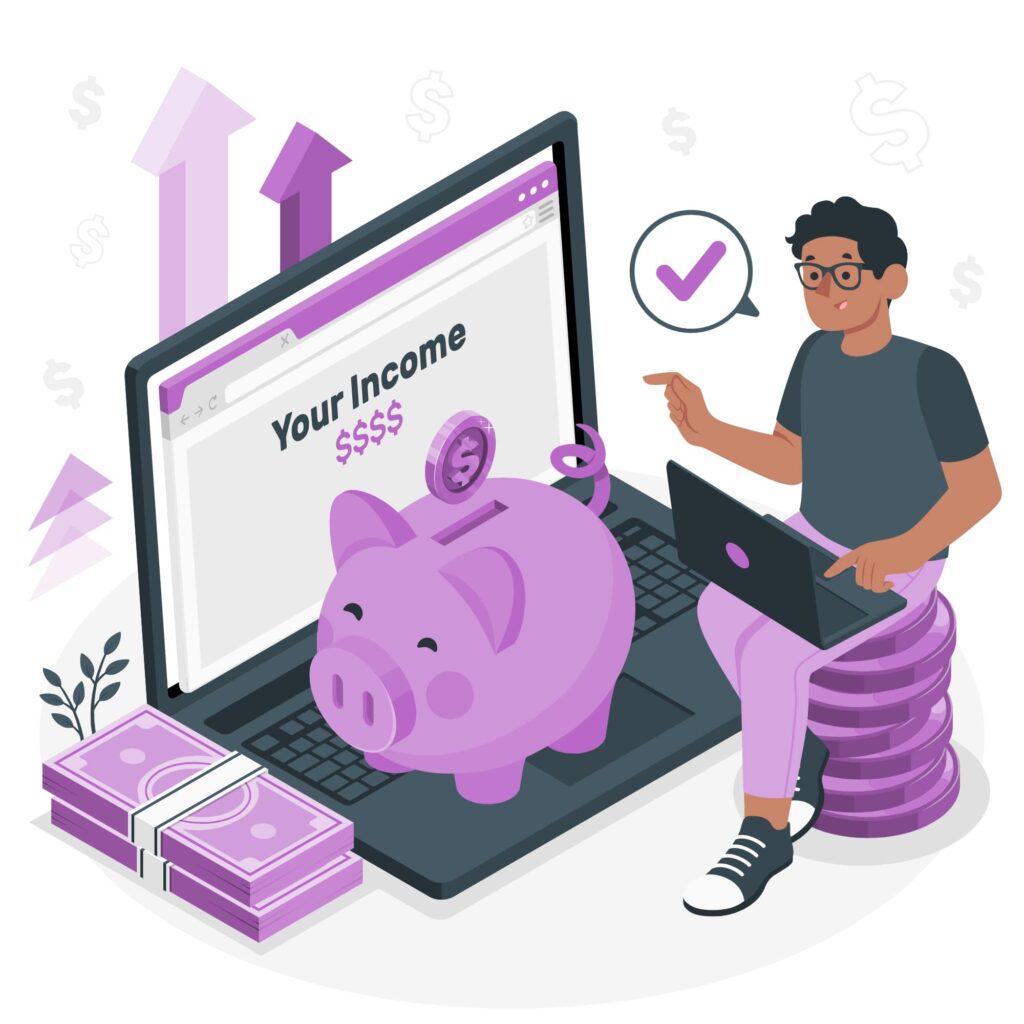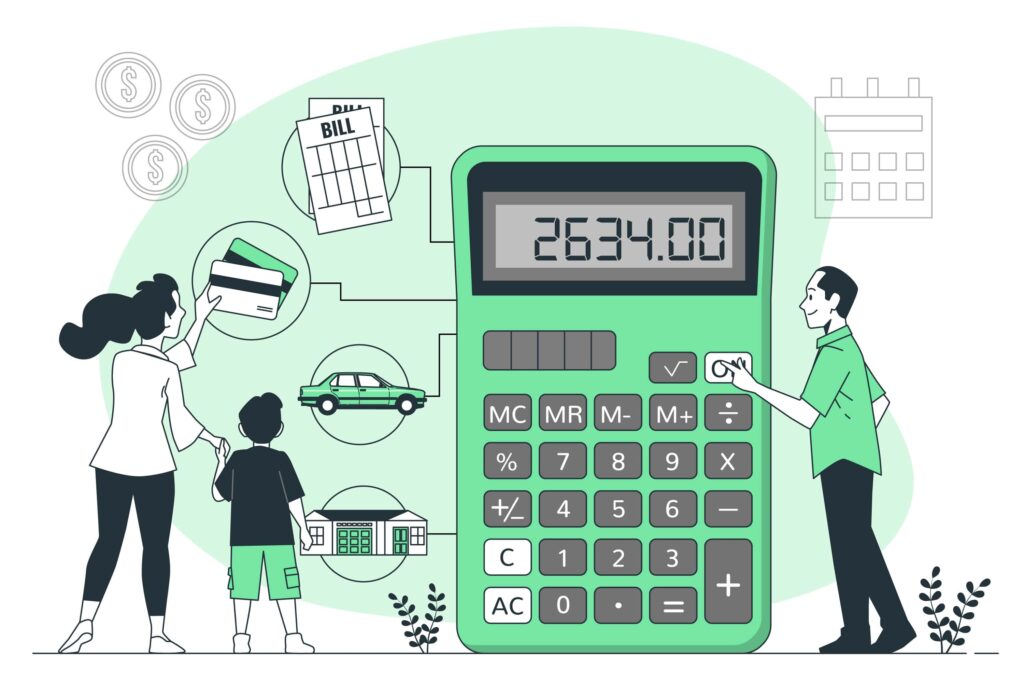10 personal finance myths that may be draining your wallet. Learn smarter money habits to save, invest, and grow your wealth effectively. 💸 #PersonalFinance #MoneyMyths”
Personal finance can often feel daunting in the fast-paced world of today. It’s simple to become a victim of enduring myths that might result in bad financial decisions when there is so much information available.
When it comes to managing money, myths and misconceptions can lead to costly mistakes. You can’t reach your financial objectives if you have the wrong ideas about investing, saving, and spending.

To help you take charge of your financial future and make wise decisions, let’s clarify some of the most widespread misunderstandings about personal money.
To lay a strong financial foundation, it is essential to comprehend the reality underlying these beliefs.
We’ll dispel ten widespread personal finance fallacies in this post that might be costing you money and offer helpful advice to help you make wise choices.
Myth 1: You Need to Be Rich to Invest
One of the most damaging myths is the belief that only the wealthy can invest. Many people think they need a large sum of money to start investing, which is simply not true.
The world of investing is open to everyone. Thanks to technology and platforms like robo-advisors or apps with low initial investment thresholds, you can start investing with as little as $10.

The earlier you start, the more you benefit from the power of compounding. Waiting for a higher income to begin could mean missing years of growth opportunities.
The key is to start early, even if you begin with small amounts. As Warren Buffett famously said, “Do not save what is left after spending, but spend what is left after saving.
The best time to start investing was yesterday. The next best time is today.
Myth 2: You Need a High Income to Save Money
Many people believe that saving money is only possible if you have a high income. This myth stems from the idea that only those with surplus income can afford to save.
However, the reality is that saving is more about financial discipline, habits, and mindset than it is about income level.
Savings are more about discipline than income level. While earning more can help, it’s how you manage what you earn that truly matters.

Even on a modest income, adopting the 50/30/20 rule—allocating 50% of your income to needs, 30% to wants, and 20% to savings—can work wonders.
Start small if needed. Consistency is the key to building a robust savings habit. It’s not about how much money you make but how much you save that matters.
The Long-Term Benefits:
- Saving even a small amount establishes the habit of paying yourself first.
- Building savings creates financial security and reduces stress.
- Over time, these habits can lead to investments, wealth growth, and financial independence.
Myth 3: Debt Is Always Bad
Debt often gets a bad reputation, and many people believe that all debt is inherently harmful. This myth creates fear and shame around borrowing money, leading some to avoid it altogether.
However, not all debt is bad—when managed responsibly, certain types of debt can even be beneficial. Understanding the difference between good debt and bad debt is key to making informed financial decisions.

Not all debt is created equal. While high-interest consumer debt like credit cards can drain your finances, other types, like student loans or mortgages, can be considered investments in your future.
Good debt helps you build wealth or improve your earning capacity, while bad debt often funds short-term gratification at the expense of long-term stability.
Types of Debt: Good vs. Bad
1. Good Debt: Debt that provides long-term value or generates income can be considered “good debt.” Examples include:
- Student Loans: Investing in education can lead to higher earning potential over a lifetime.
- Business Loans: Borrowing to start or grow a business can generate profits and create opportunities.
- Low-Interest Debt for Investments: Leveraging low-interest loans for assets like property or a diversified portfolio can result in financial gains.
Key Characteristics:
- Low-interest rates.
- Used to acquire appreciating or income-generating assets.
- Part of a long-term financial plan.
2. Bad Debt: Debt used for consumption or depreciating assets with high interest rates is typically “bad debt.” Examples include:
- Credit Card Debt: High interest rates make it difficult to pay off and can quickly snowball.
- Payday Loans: Extremely high fees and interest can trap borrowers in a cycle of debt.
- Car Loans (in Some Cases): Cars depreciate, and long-term loans may cost significantly more than the car’s worth.
Key Characteristics:
- High-interest rates.
- Used for non-essential or short-lived purchases.
- Adds no financial value or return.
How Debt Can Be Useful:
1. Building Credit: Responsible borrowing and timely repayment improve your credit score, making it easier to qualify for loans with favorable terms.
2. Leveraging Opportunities: Debt can help you seize opportunities, such as buying a home or starting a business, which would otherwise be out of reach.
3. Emergency Relief: In emergencies, having access to credit can prevent financial disaster.
The Risks of Mismanaged Debt:
While debt can be useful, mismanagement can lead to:
- Financial Stress: Difficulty meeting repayment obligations can strain your budget.
- High Costs: Accumulated interest increases the total amount you owe.
- Reduced Financial Flexibility: Too much debt limits your ability to save or invest.
Debt isn’t the enemy—it’s how you use and manage it that matters. By understanding the difference between good and bad debt and aligning borrowing with your financial goals, you can use debt as a stepping stone rather than a stumbling block.
Myth 4: You Don’t Need an Emergency Fund if You Have Credit Cards
This myth suggests that having credit cards eliminates the need for an emergency fund since you can rely on credit to cover unexpected expenses.
While credit cards can provide temporary financial relief, they are not a substitute for an emergency fund. Let’s dive into why this belief is misleading and why having an emergency fund is crucial.

Relying on credit cards for emergencies can lead to spiraling debt due to high interest rates. An emergency fund acts as a safety net, providing financial security without additional stress.
Aim to save at least three to six months’ worth of expenses in an accessible account.
Why This Myth Persists:
1. Convenience of Credit Cards: Credit cards offer quick access to funds, making them appear to be a reliable safety net.
2. Lack of Awareness About Interest Rates: Many people underestimate the high interest rates and fees associated with credit card usage, especially for large balances.
3. Overconfidence in Credit Limits: Belief that available credit is sufficient for emergencies often overlooks the financial strain of repayment.
While credit cards can play a role in managing financial emergencies, they should never replace an emergency fund.
An emergency fund provides a foundation of financial security, while credit cards are better suited as a supplemental resource.
Prioritize building your savings to protect yourself from unexpected financial shocks.
Myth 5: Renting Is Wasting Money
The belief that “renting is wasting money” is one of the most pervasive myths in personal finance. It suggests that renting offers no value because you’re not building equity in a property.
However, this perspective oversimplifies the decision between renting and owning and ignores the many advantages of renting.
Owning a home isn’t always better than renting. The decision depends on your financial situation, lifestyle, and long-term goals.

Buying comes with upfront costs like a down payment, maintenance, and property taxes that can outweigh renting flexibility.
If you’re unsure where you’ll be in a few years or prefer a lower financial commitment, renting might be the better choice for now.
Renting vs. Owning: A Balanced View
1. Owning a Home Is a Long-Term Commitment: If you’re planning to stay in the same place for many years, homeownership can make sense.
2. Renting Is Ideal for Flexibility: If your future is uncertain or you value mobility, renting may be a better option.
3. Financial Health Matters More Than Ownership Status: Whether you rent or buy, living within your means and saving for your goals is what truly matters.
Renting is not wasting money—it’s paying for a place to live and the flexibility and freedom that come with it.
Depending on your lifestyle, financial goals, and personal preferences, renting can be a smart and strategic choice.
Myth 6: Budgeting Means Restricting All Fun
One of the most common misconceptions about budgeting is that it requires cutting out all fun and entertainment from your life, leading to a monotonous and joyless existence.
This myth often discourages people from creating a budget in the first place. However, budgeting isn’t about restriction—it’s about prioritization and balance.

A budget doesn’t have to be restrictive. Instead, it’s a tool to allocate your money intentionally, ensuring you enjoy life while preparing for the future.
Budgeting allows you to set aside money for entertainment, hobbies, or vacations guilt-free because it’s already accounted for.
How to Budget Without Restricting Fun:
1. Use the 50/30/20 Rule
- Allocate 50% of your income to needs, 30% to wants (including fun), and 20% to savings.
- The “wants” category ensures you have money specifically set aside for enjoyable activities.
2. Plan for Big Treats
- If you want to splurge on something like a concert, a vacation, or a luxury item, build it into your budget by saving for it over time.
3. Automate Your Savings
- By automating savings and covering essentials first, you can spend your allocated “fun money” guilt-free, knowing your financial goals are on track.
4. Reevaluate Priorities Regularly
- Life and priorities change. Revisit your budget periodically to ensure it aligns with your current lifestyle and goals, including fun activities.
5. Use Tools to Simplify Budgeting
- Budgeting apps like Mint, YNAB (You Need a Budget), or EveryDollar make it easier to allocate funds and track spending without feeling restricted.
The Benefits of Budgeting for Fun:
1. Increased Joy and Satisfaction
- Knowing that your fun expenses are planned and accounted for allows you to enjoy them fully without financial worry.
2. Improved Financial Health
- A budget prevents overspending on entertainment, ensuring you have money for emergencies, savings, and future goals.
3. Guilt-Free Spending
- You can indulge in your favorite activities without feeling like you’re jeopardizing your financial stability.
4. Freedom to Be Spontaneous
- A budget with a built-in “fun fund” allows for spontaneous activities, like last-minute trips or dinners with friends, as long as it stays within your allocation.
Budgeting doesn’t mean cutting out all the fun; it means making intentional choices about how you spend your money.
A good budget balance needs savings, and leisure, ensuring you can enjoy life now while also preparing for the future.
Myth 7: If You’re Young, You Don’t Need to Think About Retirement Yet
A common financial myth among younger people is the belief that retirement planning can wait until later in life.
Many assume that retirement is a distant concern, best addressed once they’ve achieved other goals like buying a home or establishing their career.
However, this mindset overlooks one of the most powerful advantages of starting young: time.

The earlier you start saving for retirement, the more you’ll benefit from compound interest. Starting in your 20s or 30s gives you a significant advantage compared to waiting until your 40s or 50s.
For example, saving $200 a month starting at 25 versus 35 could result in a six-figure difference by retirement age.
Key Reasons to Start Thinking About Retirement Early
1. The Power of Compound Interest: Compound interest means you earn interest not only on your contributions but also on the interest your money has already earned. Over time, this leads to exponential growth.
- The earlier you start, the more time your money has to grow. Even small contributions in your 20s can surpass larger contributions made in your 40s due to the compounding effect.
Example:
- Starting at 25: If you save $200 per month at a 7% annual return, you’ll have about $480,000 by age 65.
- Starting at 35: If you save the same amount, you’ll only have about $240,000 by age 65.
2. Smaller Contributions Needed Over Time
- Starting early means you can save smaller amounts each month to reach the same goal compared to someone who starts later.
Example:
- To save $1 million by age 65:
- Start at 25: You need to save ~$300/month.
- Start at 35: You need to save ~$600/month.
- Start at 45: You need to save ~$1,300/month.
3. Retirement Costs Are Higher Than You Think
- Longevity Is Increasing: People are living longer, meaning you’ll need to fund a longer retirement.
- Rising Healthcare Costs: Medical expenses often increase with age and are a significant part of retirement expenses.
- Inflation: The cost of living will be much higher decades from now, so the money you save today will need to grow substantially to maintain your purchasing power.
4. Financial Independence and Flexibility
- Retirement Isn’t Just About Stopping Work: Planning early lets you choose how and when to retire.
- Early Retirement Options: Starting young increases the likelihood that you can retire earlier or pursue passion projects without financial stress.
5. Employer Benefits and Matching
- Maximize Employer Contributions: If your employer offers a retirement plan like a 401(k) with matching contributions, you’re leaving free money on the table by not participating.
- Tax Advantages: Contributions to retirement accounts like 401(k)s or IRAs often come with tax benefits, reducing your taxable income today while helping you save for the future.
Thinking about retirement when you’re young isn’t just wise—it’s transformative. By starting early, you harness the power of time and compound interest, setting yourself up for financial independence and a stress-free retirement.
Myth 8: You Should Always Buy in Bulk to Save Money
Buying in bulk is often marketed as a way to save money, and while it’s true in many cases, it’s not a universal rule.
The assumption that bulk purchases are always the most economical choice can lead to overspending, wasted resources, and inefficient use of storage space.
Buying in bulk can lead to savings, but it’s not always the smartest choice. Overbuying perishables or items you rarely use can waste money instead of saving it.

Evaluate the shelf life and your actual needs before purchasing bulk items. Sometimes, paying more per unit makes sense if it avoids waste.
How to Avoid Overspending on Bulk Purchases
1. Calculate the Unit Price: Divide the total cost by the quantity or weight to determine the cost per unit. Compare this to smaller packages to confirm savings.
2. Plan Your Usage: Estimate how quickly you’ll use the item and whether it will stay fresh during that time.
3. Check Expiration Dates: Avoid bulk buying perishable items with short shelf lives unless you’re certain you can use them in time.
4. Track Your Spending: Monitor how much you’re spending on bulk purchases and whether they’re leading to waste.
5. Avoid Impulse Buys: Bulk stores often encourage impulse purchases with attractive deals. Stick to your shopping list.
Bulk buying can be a smart financial strategy, but it’s not a one-size-fits-all solution. To truly save money, evaluate the unit price, consider your consumption habits, and ensure you have the storage space and cash flow to support it.
The key is to focus on value, not volume, ensuring your purchases align with your actual needs and lifestyle.
Myth 9: Financial Advisors Are Only for Rich People
One of the most pervasive financial myths is the belief that financial advisors are only for the wealthy.
Many people think that financial planners, wealth managers, or investment advisors are exclusively reserved for individuals with large incomes, high net worths, or complex financial situations.
This myth discourages people from seeking professional financial advice, even when it could significantly benefit them.

Financial advisors offer valuable guidance that’s accessible to everyone. Many advisors work on an hourly or project basis, allowing you to seek help without committing to high fees.
They can assist with creating budgets, planning investments, and achieving long-term goals—even if you’re just starting.
Myth 10: You Should Pay Off Your Mortgage Before Investing
The belief that you should prioritize paying off your mortgage before starting to invest is a common piece of financial advice.
While it’s true that being debt-free can provide peace of mind, this myth oversimplifies the complex decisions that individuals need to make about their finances.

In reality, paying off a mortgage early may not always be the best financial decision, especially when considering the potential benefits of investing.
While eliminating debt is essential, paying off your mortgage early might not always be the best use of extra cash. Mortgage rates are often lower than potential returns from investments.
A balanced approach—paying off high-interest debts while investing in assets that grow over time—is often more effective.
Final Thoughts
Navigating personal finance requires distinguishing facts from myths. By understanding these misconceptions, you’ll be better equipped to make smart decisions that align with your financial goals.
Start busting these myths today! Take charge of your finances by educating yourself, creating a plan, and seeking expert advice when needed. Remember, financial freedom is within your reach.
#PersonalFinance #MoneyMyths #FinancialFreedom #SmartMoneyMoves #WealthWisdom
Recommended Personal Finance Books
1. “The Total Money Makeover” by Dave Ramsey
A practical guide to eliminating debt and building wealth using a step-by-step approach.
Book Buy Link: Amazon Click Here
2. “Your Money or Your Life” by Vicki Robin and Joe Dominguez
This book provides a holistic approach to achieving financial independence and aligning spending with your values.
3. “Rich Dad Poor Dad” by Robert T. Kiyosaki
A classic that contrasts different mindsets about money and introduces concepts like assets and liabilities.
4. “The Psychology of Money” by Morgan Housel
An insightful read on how emotions and behavior affect financial decisions.
5. “Atomic Habits” by James Clear
While not strictly about finance, this book teaches you how to build habits that can also improve your financial discipline.
6. “I Will Teach You to Be Rich” by Ramit Sethi
A fun, practical guide to managing money, including automation and optimizing spending without guilt.
7. “Financial Freedom” by Grant Sabatier
A step-by-step blueprint to achieving financial independence faster than traditional methods.
Other Interesting Posts To Read:
The 10 Commandments of Long-Term Investing Success
10 Smart Investment Strategies for First-Time Investors
10 Stoic Habits That Can Help & Guide You Toward Financial Independence 🏦
10 Financial Freedom Lessons Men Learn Too Late In Life
5 Smart Budgeting Hacks to Save Big in 2025


